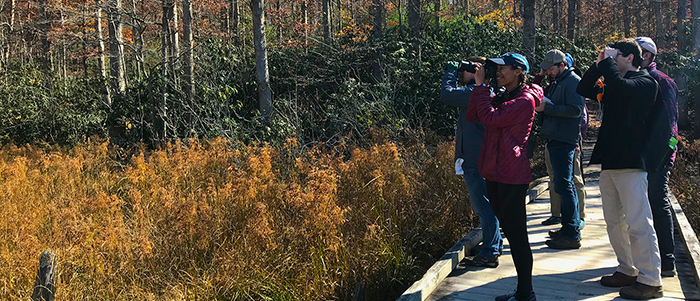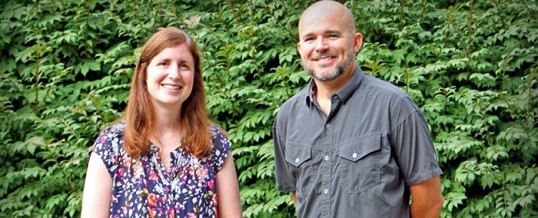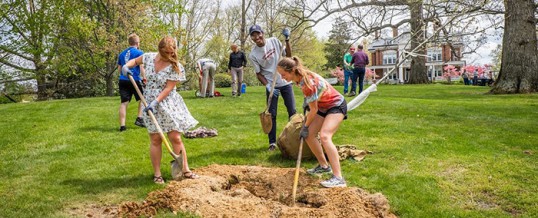[vc_row][vc_column][vc_single_image image=”61700″ img_size=”full” alignment=”center” style=”vc_box_border”][vc_column_text]
APRIL 25, 2022
The Seventh Annual Interfaces of Global Change (IGC) Graduate Research Symposium was held on Earth Day, April 22, 2022. The annual meeting provides a space to showcase and celebrate the important and impressive work of the IGC Fellows. It’s also a time for Fellows and GCC faculty to interact and explore connections between labs across campus. This year’s symposium agenda included 10 platform presentations, ~24 poster presentations, 3 capstone project presentations and a keynote talk by Dwight Bigler, associate professor and director of Choral Activities in the School of Performing Arts at Virginia Tech, followed by an awards reception.
The symposium highlighted the latest research from the program’s graduate student fellows, whose collective work addresses critical global changes impacting the environment and society. This includes problems surrounding climate change, pollution, invasive species, disease, and habitat loss.
Platform awards for Best Presentation were selected for the top three platform presentations.[/vc_column_text][vc_btn title=”View pictures from the event in the Flickr album here!” color=”green” align=”center” link=”url:https%3A%2F%2Fwww.flickr.com%2Fphotos%2Fglobalchangevt%2Falbums%2F72177720298390863||target:%20_blank|”][vc_separator css=”.vc_custom_1650946980983{margin-top: 20px !important;}”][vc_column_text]
Congratulations! Best Platform Presentation Awardees:
[/vc_column_text][vc_row_inner][vc_column_inner width=”1/3″][vc_single_image image=”61715″ img_size=”300×300″ style=”vc_box_border”][/vc_column_inner][vc_column_inner width=”2/3″][vc_column_text]
First Place and recipient of the 2022 Karen P. DePauw Outstanding Interdisciplinary Presentation Award:
Abby Lewis (Biological Sciences), Anoxia decreases carbon sequestration over multi-annual timescales in two freshwater reservoirs[/vc_column_text][/vc_column_inner][/vc_row_inner][vc_row_inner][vc_column_inner width=”1/5″][vc_single_image image=”33843″ img_size=”250×250″ style=”vc_box_border”][/vc_column_inner][vc_column_inner width=”4/5″][vc_column_text]
Second Place:
Sam Lane (Biological Sciences), How does urbanization impact female song sparrows? A comparison of physiological and behavioral recovery from disturbance[/vc_column_text][/vc_column_inner][/vc_row_inner][vc_row_inner][vc_column_inner width=”1/5″][vc_single_image image=”28247″ img_size=”250×250″ style=”vc_box_border”][/vc_column_inner][vc_column_inner width=”4/5″][vc_column_text]
Third Place:
Daniel Smith (Biological Systems Engineering), Inert fibers and soil microorganisms promote stream bank soil resistance to fluvial erosion[/vc_column_text][/vc_column_inner][/vc_row_inner][vc_row_inner][vc_column_inner][vc_column_text]Congratulations to all of the presenters, and thank you to the Global Change Center community for showing up to engage and support interdisciplinary, global change research and collaboration across the Virginia Tech campus! [/vc_column_text][/vc_column_inner][/vc_row_inner][/vc_column][/vc_row][vc_row][vc_column][vc_raw_html]JTNDYSUyMGRhdGEtZmxpY2tyLWVtYmVkJTNEJTIydHJ1ZSUyMiUyMGhyZWYlM0QlMjJodHRwcyUzQSUyRiUyRnd3dy5mbGlja3IuY29tJTJGcGhvdG9zJTJGZ2xvYmFsY2hhbmdldnQlMkZhbGJ1bXMlMkY3MjE3NzcyMDI5ODM5MDg2MyUyMiUyMHRpdGxlJTNEJTIySUdDJTIwR3JhZHVhdGUlMjBTeW1wb3NpdW0lMjAyMDIyJTIyJTNFJTNDaW1nJTIwc3JjJTNEJTIyaHR0cHMlM0ElMkYlMkZsaXZlLnN0YXRpY2ZsaWNrci5jb20lMkY2NTUzNSUyRjUyMDI5ODU4OTE4XzVhOGYwMDlmMWZfei5qcGclMjIlMjB3aWR0aCUzRCUyMjY2MCUyMiUyMGhlaWdodCUzRCUyMjQ4MCUyMiUyMGFsdCUzRCUyMklHQyUyMEdyYWR1YXRlJTIwU3ltcG9zaXVtJTIwMjAyMiUyMiUzRSUzQyUyRmElM0UlM0NzY3JpcHQlMjBhc3luYyUyMHNyYyUzRCUyMiUyRiUyRmVtYmVkci5mbGlja3IuY29tJTJGYXNzZXRzJTJGY2xpZW50LWNvZGUuanMlMjIlMjBjaGFyc2V0JTNEJTIydXRmLTglMjIlM0UlM0MlMkZzY3JpcHQlM0U=[/vc_raw_html][vc_separator style=”shadow”][/vc_column][/vc_row]








